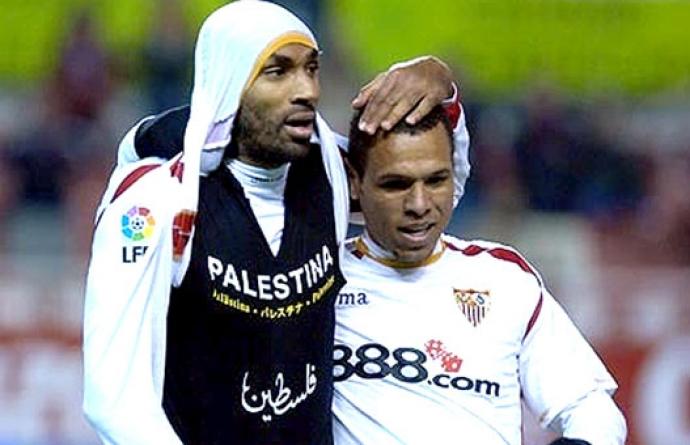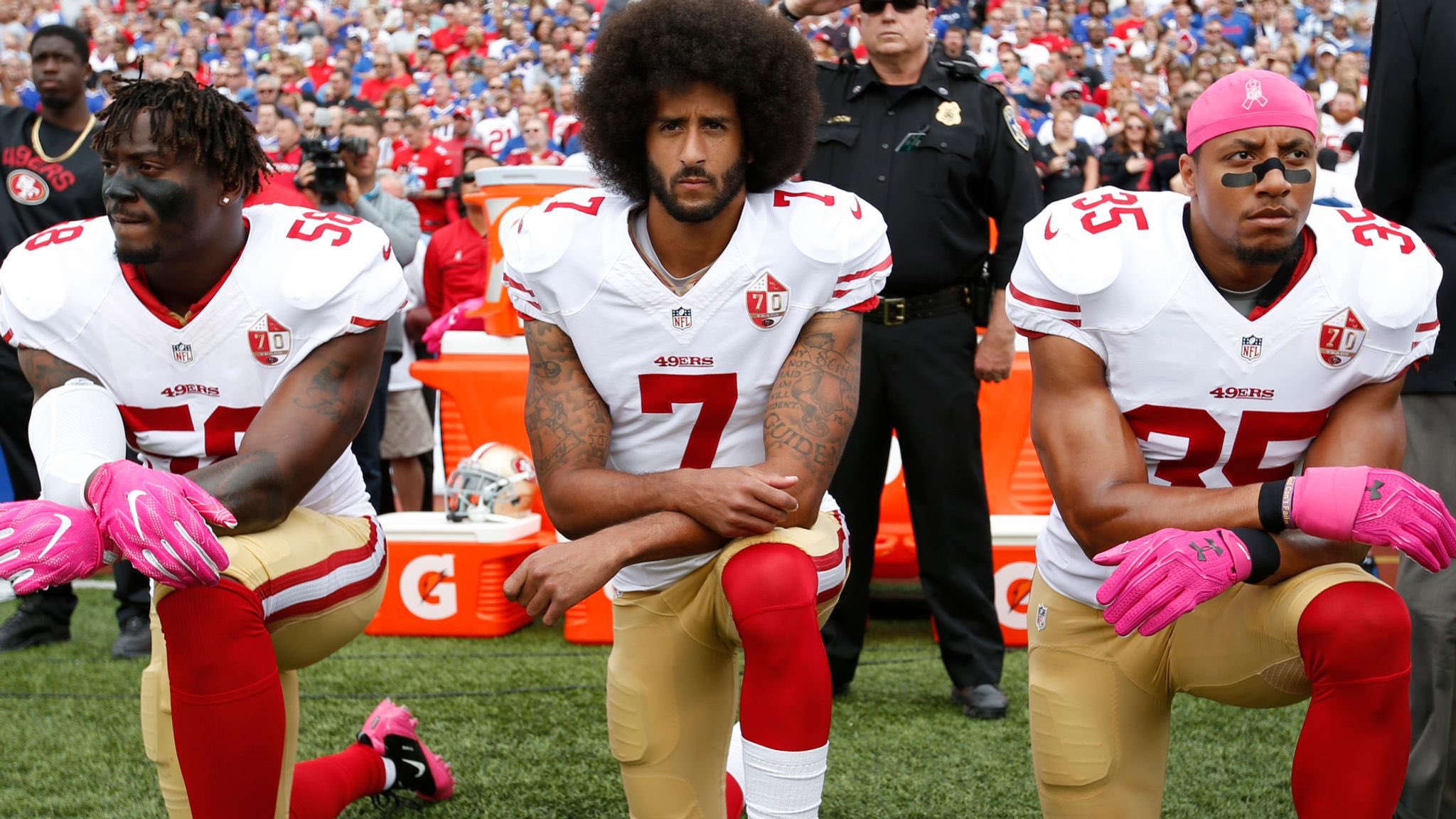Sports has long been used as a medium of political expression, with sports diplomacy weighing various topics differently across the scale of humanitarian urgency. Some political discussions are deemed ‘too political’ and hence not ‘appropriate’.
Historically, Ancient Greece was known for fusing politics with sports. During the Olympic Games, Greek leaders discussed important political issues, celebrated military victories and formed political and military alliances.
In the contemporary time, however, sport officials and bodies claim that the industry should not mix with politics. Despite this very malleable assertion, many prominent sports figures risk their positions on the podium to spread awareness about a cause they deem to be important, raising the voices of the voiceless on a global stage.
Palestine
The topic of Palestine has always been labelled as “too political”, forcing many to tread lightly around it. This became apparent when the Russian invasion of Ukraine normalised the trend of mixing politics and sports, prompting pro-Palestine advocates around the world to question the double standard approach.
Former Egyptian football player and beIN Sports commentator Mohamed Aboutrika displayed solidarity with Palestinians facing an Israeli-Egyptian blockade in Gaza in 2008. Following a goal against Sudan during the Africa Cup of Nations, the Egyptian icon lifted his shirt to flash the message “Sympathy with Gaza”.
The Confederation of African Football was quick to issue him a warning for “mixing politics with sports”.
Aboutrika had also recently called for banning the Zionist entity from competing in all sporting events, after similar action was taken against Russia.
“The decision to ban Russian clubs and teams from participating in all tournaments must be accompanied with a ban on clubs and teams under the Zionist entity, because it is an occupier that has been murdering children and women in Palestine for years,” he said.

Similarly, solidarity with Palestine was emboldened with yet another T-shirt revelation by Frederic Kanoute, who bore the words “Palestine” in five different languages on his chest.
He was later fined by the Royal Spanish Football Federation for his move in a match against Deportivo La Coruña in 2009.
Qatar
Qatar’s national team players warmed themselves up with a shirt bearing the face of the Amir Sheikh Tamim bin Hamad Al Thani in a qualifying match against South Korea in 2017.
It came as Qatar at the time faced an illegal air, land and sea blockade by neighbouring Saudi Arabia, United Arab Emirates, Bahrain, and Egypt.
The amir’s black and white portrait, which had come to represent defiance among Qataris in response to the diplomatic crisis, was imprinted on the players’ shirts in the United Arab Emirates where the game was being hosted.
At the time, the country’s football federation was reprimanded and fined by FIFA for ‘getting political’ at a World Cup qualifying match.
The QAR 188,800 penalty was issued, with FIFA saying Qatar was sanctioned for “displaying a political image” and for “improper conduct among spectators (political displays).”
Prominent footballer Hassan Khalid Al Haydos was also fined QAR 18,700 for “unsporting behaviour.”
According to the Associated Press, the move to fine the Qatari player was due to his decision to take a T-shirt from a fan with the amir’s face and lift it high in the air after scoring a goal.
Iran
Iran’s national team, Team Melli, on 27 September made clear its solidarity with the most recent protests in the Islamic Republic during a friendly with Senegal in Maria Enzersdorf, a town just outside Vienna.
Standing arm in arm on the pitch, the players wore plain black jackets to cover their national symbols as the national anthem was played at the stadium.
Described as “brave”, the team’s act of solidarity came as protests raged across Iran, where hundreds of thousands demonstrated against the government following the death Mahsa Amini.
Amini was visiting Tehran when she was arrested by morality police who accused her of failing to wear the hijab in accordance with government standards. She later died in hospital, with Iranian police maintaining she died of natural causes, while her family saying she was tortured and killed.
The team’s forward Sardar Azmoun spoke out on the decision to protest the government’s brutal crackdown on his social media page, saying it is worth any consequences that may arise.
“At worst, I’ll be dismissed from the national team. No problem. I’d sacrifice that for one hair on the heads of Iranian women. This story will not be deleted. They can do whatever they want. Shame on you for killing so easily; long live Iranian women,” Azmoun wrote.
In the case of Iran, explicit acts of state and sports coexistence was especially highlighted in 2017 when the Iranian government banned two prominent players from the national team for their participation in a match with their club team in Greece against an Israeli team.
“It is certain that Masoud Shojaei and Ehsan Haji Safi will never be invited to join the national football team because they violated the red line,” Mohammad Reza Davarzani, Iran’s deputy sports minister said at the time on Iranian state television, according to reports.
Iran’s parliament, in a special meeting of the foreign policy committee at the time, denounced the two players.
“Agreeing to play in a game against athletes of a regime that has given humanity nothing other than occupation, murder, aggression and betrayal is disrespectful of the rights of thousands of martyrs and those displaced and affected by the occupying Zionist regime,” the spokesman for the committee, Hossein Naghavi-Hosseini, told the semiofficial Mehr News Agency, reports said.
Tehran prohibits Iranian athletes from competing against Israeli players in any contest or tournament, including the Olympics.
Iran’s Supreme Leader Ayatollah Ali Khamenei has often praised Iranian athletes who refuse to compete against Israelis. In September last year, the Iranian leader said the players should continue to do so even if risk of punishment by international sports bodies may be looming.
Black Lives Matter
Colin Kaepernick raised his voice for Black Lives Matter movement as well as racial disparity in August 2016 when he knelt down during the American national anthem.
The silent protest during the NFL preseason game between the San Francisco 49ers and the Green Bay Packers triggered outrage nationwide, prompting the NFL to briefly ban kneeling or sitting during the anthem.
By 2017, Kaepernick was unable to find a team willing to draft him. He filed a grievance with the NFL and accused the league of blackballing him.
Separately, Milwaukee Bucks players made a decision to abstain from playing in Game 5 of its first round play-off series against Orlando in 2020 over the police shooting of Jacob Blake, a 29-year-old Black man in Kenosha, Wisc, who was killed in front of his three children.
More teams followed their footsteps, calling for urgent action. In turn, the NBA agreed to establish a social justice coalition, “one represented by players, coaches and owners, that will tackle a broad range of issues, from civic engagement to advocating for meaningful police and criminal justice reform,” reports said.
The NBA also committed to collaborating with the players and media partners to develop commercials that will air before each game and are “dedicated to promoting greater civic engagement in national and local elections and raising awareness around voter access and opportunity.”
The NBA also listened to its players during the “Black men have to vote” campaign in light of government elections at the time. The campaign attempted to raise aware on the lack of adequate access to Black people and saw arenas being converted to polling stations.
Soon after the agreement was made public, the Knicks and Clippers announced that Madison Square Garden and The Forum would become voting centres.







